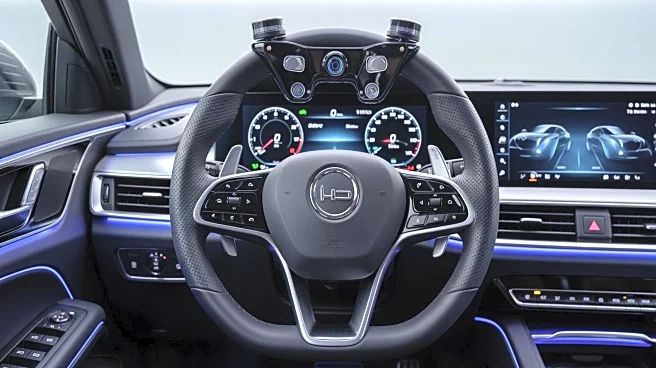What's Happening?
General Motors (GM) has announced the integration of a 'Level 3' conditional automated driving system in the Cadillac Escalade IQ, set to debut in 2028. This system, described as 'hands off, eyes off,' will utilize advanced digital mapping, lidar, and machine
learning to manage driving tasks in controlled environments at speeds up to 80 mph. The announcement was made during a preview event in New York City, where GM CEO Mary Barra emphasized a safety-first approach and a faster rollout compared to previous technologies like Super Cruise. Initially limited to the Escalade, GM plans to expand this system across its vehicle lineup, aiming for operation in all 50 states and under various weather conditions.
Why It's Important?
The introduction of GM's advanced driver assistance system marks a significant step in the evolution of autonomous vehicle technology in the U.S. By offering a system that allows drivers to engage in other activities while the vehicle handles driving, GM is pushing the boundaries of convenience and safety in automotive technology. This development could influence the competitive landscape, as other automakers may accelerate their own autonomous driving initiatives. The system's potential to operate in diverse conditions across the country could set a new standard for driver assistance systems, impacting consumer expectations and regulatory frameworks.
What's Next?
GM plans to expand the operation areas of the system to cover more roads, making driving unnecessary in many situations. The company aims to integrate more AI functionality into its vehicles, enhancing interaction through natural language processing. As GM rolls out this technology, it may face scrutiny from regulatory bodies and consumer advocacy groups concerned about safety and reliability. The success of this initiative could lead to broader adoption of autonomous driving technologies, prompting discussions on legal and ethical implications, such as liability in case of accidents.
Beyond the Headlines
The deployment of GM's hands-free driving system could have long-term implications for urban planning and infrastructure development. As autonomous vehicles become more prevalent, cities may need to adapt their road systems to accommodate these technologies. Additionally, the shift towards AI-driven vehicles raises questions about data privacy and cybersecurity, as these systems rely heavily on digital mapping and machine learning. The integration of AI in vehicles also highlights the growing intersection between automotive and tech industries, potentially leading to new collaborations and innovations.














